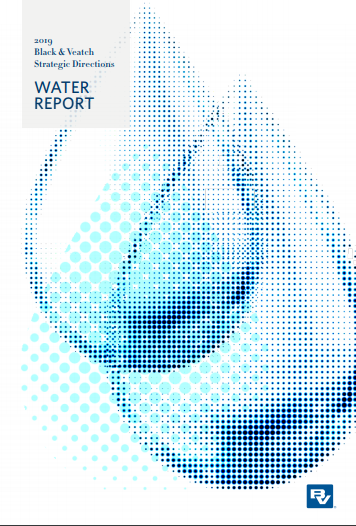New report says shift to digital water can help overcome threats to water supplies
- June 11, 2019
- Posted by: administrator
- Category: Companies, Engineering, Global, Technology & Innovation, Water Issues

A new report is highlighting the critical role of data and planning in water infrastructure systems and says a shift to digital water can help overcome threats to water supplies.
The findings of Black & Veatch’s just-released 2019 Strategic Directions: Water Report suggest that smarter infrastructure, with data at its core, will play a crucial role in overcoming varied threats to water supply.
From precise reads of consumption rates and customer engagement to improved leak detection and climate change planning, a new culture of data science can extend supply to drive sustainability and resilience, the report concludes. The accelerating move to embrace digital water by service providers and industry leaders will also better inform the asset management and planning programs necessary to overcome continued funding challenges.
Built on data collected in the company’s annual survey of water industry leaders in North America, the report finds that just as manufacturing and industry has embraced the Internet of Things (IoT) to connect technologies and add value to daily lives, data “has woven itself into the central fabric of our water economy.”
Survey responses clearly reflect data’s role in utility operations, with more than 90% of respondents saying they rely heavily on meter and billing data, customer information, SCADA systems and operations data to manage operations.
However, while enthusiasm over data creation runs high, just 5% of respondents indicated they had implemented a robust, fully-integrated approach to data management, while nearly 60% said their data efforts were getting stronger but weren’t fully integrated. All too often, data is collected but siloed, missing a key opportunity to present a holistic and actionable view of critical systems.
Cindy Wallis-Lage, president of Black & Veatch’s water business commented:
“The Internet of Water – through next-generation collection devices and predictive analytics – has ushered in the ability to funnel disparate data into a single, meaningful snapshot of the entire water ecosystem.”
“This ‘single version of the truth’ allows a user to gain insight on the connectivity and synergies within a system to drive operational efficiency, performance predictability, maintenance planning and optimize workforce needs. Data has the power to guide us to new levels of reliability and system optimization.”
The report also investigates other issues and trends impacting the water industry today. Analysis of the nexus of water and “new energy” explores how water utilities are working to integrate renewables, both to optimize energy use and lower costs.
Resilience is addressed from the perspective of too much water – as regions within the U.S. struggle with legacy conveyance strategies, some communities are turning to transformational water infrastructure while others implement short-term fixes. The report also explores the problems of too little water, as arid conditions and frequent drought cycles challenge supply and prompt innovation through water reuse, data analytics and other strategies.
As water utilities focus on improving customer service and meeting quality and environmental regulatory targets, there is also an emerging emphasis on asset management, particularly predictive maintenance.
The level of access to once ground-breaking technologies is accelerating as artificial intelligence, data analytics tools and smart sensors become less expensive and more widely available, offering water utilities options as they work to manage aging water infrastructure.
“From inside the fence to behind the meter, digital water is pushing data’s potential deeper into organizations, influencing planning, asset management, customer interaction and operations,” said John Chevrette, president of Black & Veatch management consulting. “As more organizations incorporate digital strategies into their offerings, the result promises a water ecosystem that is responsive, secure, resilient and abundant, helping to end the threat of Day Zero altogether.”
Other key findings in the report include:
- Respondents say they’re collecting quality data, with 90% of respondents saying their data is excellent, very good, or good. Ten percent reported the quality of their data was poor.
- Although one-third of respondents schedule preventive maintenance according to manufacturer recommendations, 30% follow the status quo, reactively fixing or repairing equipment based on usage.
- Eighty-six percent of respondents see resilience as a critical priority. But of that number, only half have developed an approach to address the issue, while 36% have yet to make formal plans for achieving it.
- Catastrophic infrastructure failure tops the list (59%) of resilience concerns, followed by natural or manmade disaster (58%), drought (44% ), climate change (34%), cyber-attack (31%) and terrorist attack (8%).
- While two-thirds of respondents see energy management as very or extremely important, just less than half have an energy master plan in place. One-quarter are working to develop an energy master plan, but the remaining 26 percent have no roadmap toward a plan.
The Black & Veatch report is based on a survey of 430 participants across the municipal, utility and technology sectors.
The report includes insights from itss software subsidiary, Atonix Digital.
Click here to download 2019 Strategic Directions: Water Report
